“They Knew”: The Feds’ 50-Year Climate Failure
Air Date: Week of September 24, 2021
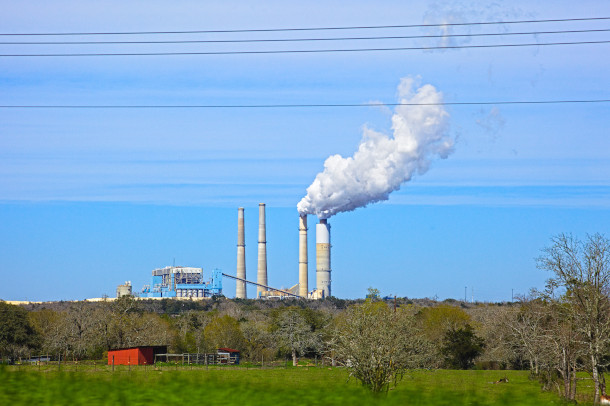
Fayette Power Project, a coal power plant in La Grange, TX 2019. (Photo by Sam LaRussa on Unsplash)
For the past 50 years, the US government has known about the problem of climate change but has continued to promote fossil fuel development and done little to avert a crisis. Environmental lawyer and leader James Gustave (“Gus”) Speth chronicles this failure in his new book, “They Knew: The U.S. Federal Government’s Fifty-Year Role in Causing the Climate Crisis.” He joins Host Steve Curwood to discuss the culpability of both Republican and Democratic administrations from Presidents Carter to Trump.
Transcript
CURWOOD: It’s Living on Earth, I’m Steve Curwood.
The United States Government has known about the catastrophic dangers of climate change for some 50 years. It knew that continuing to emit greenhouse gasses would pose an existential threat to life as we know it, causing sea level rise, drought, fire and more. Yet it did little to actually tackle the problem and continues to spend billions to subsidize the fossil fuel industry. James Gustave Speth is a lawyer who led the White House Council on Environmental Quality back in the Carter Administration. He also spent a decade running the United Nations Development Program another decade as dean of Yale’s School of the Environment, and most recently joined the faculty of Vermont Law school, now a pro bono advisor to the legal team behind Juliana v US which alleges the federal government is failing to protect the rights of young people to have a livable planet. From that work he has written the book They Knew: The US Federal Government’s Fifty-Year Role in Causing the Climate Crisis. And he joins us now to share his wisdom from those years. Gus Speth, welcome to Living on Earth!
SPETH: Hello, Steve, it's been a while since we've talked together, and I'm delighted to be back with you.
CURWOOD: Gus, going back to look at fifty years, the federal government has not been doing what it ought to have on the question of climate disruption. Tell me how you got involved. As I understand, back during the Carter administration, you were chairing the President's Council of Environmental Quality?
SPETH: Yes, that seems like a long time ago. But they, when they needed a history of federal malfeasance, really, on the climate issue, in this lawsuit, they asked me to write the Carter administration up because it was a pivotal point when it was really the first time that the climate issue moved into the high levels of government in the White House. And I did, I wrote up the Carter administration. I thought I did a pretty good job, and I said, well, that was just four years; I'm done with that. And then they said, oh, by the way, would you do all the other administration's too, and I did a double take. But fortunately, this wonderful advocacy for children, Our Children's Trust, they had done an immense amount of documentary research. So I had all that at my disposal, so to speak, to work with in writing up what became, now, the book.
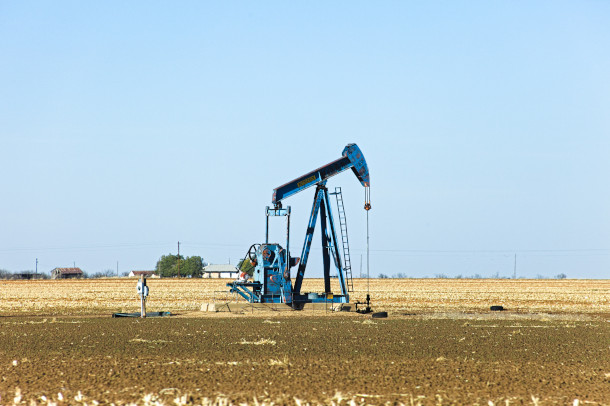
A pump jack used to extract crude oil from a well in Texas, 2019. (Photo by Sam LaRussa on Unsplash)
CURWOOD: So, what did the Carter administration understand about climate disruption then? And what did they do? And what did they fail to do?
SPETH: Well, this is a key part of the book I think, Steve, because people don't appreciate how much was known over forty years ago, about the climate issue, and how much was understood about the need for action. In the very beginning of the Carter administration, the President's Science Advisor, Frank Press, wrote a substantial memo to President Carter copied to the Jim Schlesinger, who was going to become the new Secretary of Energy, outlining the seriousness of the climate threat. And explaining it, the science of it, and basically said that we're going to have to do something about this issue. That it’s not a pressing urgency right now, but basically, it will be.
CURWOOD: At one point in your book, you point out that the scientific estimates of what the effect of adding all this carbon dioxide in the atmosphere would do pretty much tally up with what we're seeing, now, in 2021. To a remarkable degree.
SPETH: Yes, you know, it was predicted that we were going to see sea level rise, floods, droughts, heat waves, you know, fires and other things that were going to follow loss of species and human health impacts. And partly as a result of that, actions were taken in the Carter administration that I think, you know, set us on the right path. And he said repeatedly that the future of our energy in this country is going to renewable sources of energy.
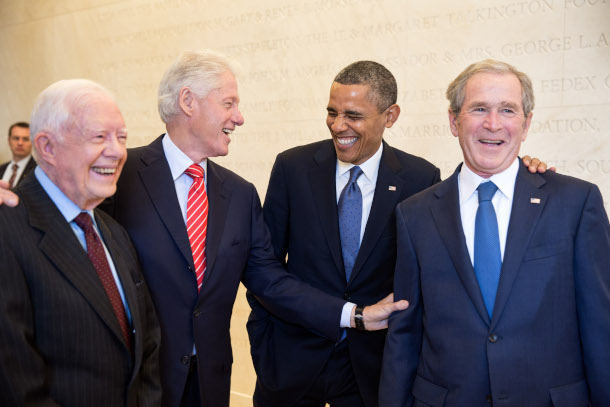
Former US Presidents Carter, Clinton, Obama, and George W. Bush. (Photo: Obama White House Archived, Flickr, Public Domain)
CURWOOD: Yeah, but what about Carter's call for synfuels, using coal instead of oil? I mean, coal has a lot more carbon per unit of energy in it than oil does. It's the worst offender now here on the planet. And President Carter's call for that sent a basic signal that he wasn't interested in having such a fundamental change in our energy structure, that there would be room for going renewable, or maybe I'm not reading that correctly.
SPETH: Well, you're certainly reading it correctly, that he called for a major synfuels program, and it increased coal use as a result of his administration. But he also knew that we had to shift over time to renewables. And he began promoting that, including famously that putting the solar collectors on the White House. So this was not a perfect situation, but it was a lot better than what followed, for example, because in comes Ronald Reagan, and takes a blowtorch to, you know, so many of the things that Carter was seeking to do.
CURWOOD: Yes. So there's the story that President Reagan, what took the solar panels off the White House? What else did he do to push back against the more renewable future that Jimmy Carter had envisioned?
SPETH: Well, just to take one set of examples having to do with renewable energy, yes, he did take the solar installations off of the White House symbolically, you know. More practically, he gutted the Carter solar programs that Carter had put in place, and abandoned the goal that Carter had set for the country of having 20% renewable energy by the year 2000. So you know, twenty years down the road, at that point, and we could have gone to 20% renewables, but we didn't. And I hope the book puts to rest, for at least those who have access to it. The idea that there's been so much uncertainty about the climate issue we didn't know, now we've finally discovered that it's real. That's really nonsense. We knew that it was real a long long time ago, and the science has been consistent in this period.
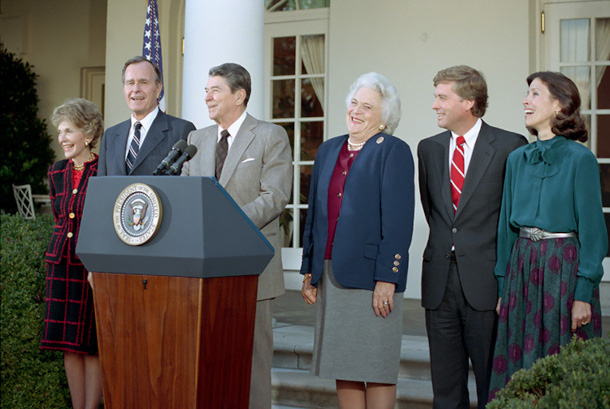
President Reagan speaking in the Rose Garden in November of 1988 with newly elected President-elect H.W. Bush. (Photo: Courtesy of the Reagan Library Public Photo Archives # C50354-14)
CURWOOD: And talking about the US Federal Government's fifty-year role in causing the climate crisis, you tend to cite the Democrats as having promise, but not necessarily having performance. You give less credit to the Republicans. But really, it seems like it's a bipartisan effort has been done here to really not have substantive action that responds to the scale of the crisis that the climate presents to us. Why do you think that is? Why is it that neither Democratic administrations or Republican administrations have moved forward to really have a net gain on dealing with the climate crisis?
SPETH: Well, for starters, I think we've run a forty-year experiment on whether we can rely on the federal government to rise to the occasion on this climate issue. And we know the results of that experiment. And that is that they can't and won't. I would say that it'd be a mistake to think that every party had sort of failed, that the parties had failed equally, in every administration. The truth is that we've had three administrations that have wanted to do something about the issue, and indeed have taken steps to deal with the issue. Those administrations are, you know, Carter and Clinton and Obama. And in each case, they were followed by a flame thrower administration, that happened to be a Republican administration. And the flame throwers sought to burnout, any of the stuff that the prior administration had been undertaking.
CURWOOD: So President Obama came into office with great promise and strong rhetoric. But at the end of the day, you write that his call for an all of the above energy strategy, essentially undermine virtually all the progress that he would have had with his other plans to deal with the climate. So even Barack Obama, who said many of the right things about the climate, history will see as a failure to deal with it.
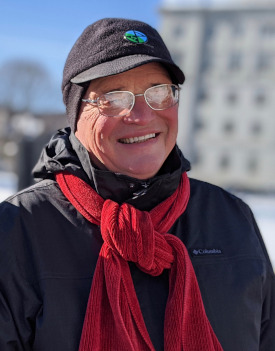
Gus Speth, the author of They Knew: The Government’s Fifty-Year Role in Causing the Climate Crisis. (Photo: Courtesy of MIT Press)
SPETH: Well, they've all been failures to deal with it. And that includes Obama, and every other administration. And that is a sad commentary, but it's the conclusion that I reluctantly came to in writing the book. They were all of the above, when it came to energy policy. At best they said, then promoted good things about renewables and efficiency. But at the same time, they were very proud of their accomplishments in moving fossil fuels forward. And in Obama's case, in promoting fracking and US exports of fossil fuels. So this has been a repeated pattern.
CURWOOD: As I understand it, there's some, what, $120 billion a year right now in federal subsidies to the fossil fuel business, which is more than we spend on things like, say, public education. To what extent is President Biden calling for the elimination of those subsidies in this budget reconciliation bill?
SPETH: Well, one of the mysteries, of course, is to know exactly what is inside this legislation. And I don't pretend to be an expert on all of that. But I have certainly seen and read that the fossil fuel subsidies continue in this reconciliation package, which is, you know, one of the disturbing things about it. There are a lot of good things in there. And the big good thing, is the plan to incentivize our electric utilities to shift to renewable power quickly. And are they going to get through? I certainly don't know, Senator Manchin, who has his key role in this process as a Chairman of the Energy Committee in the Senate, and also someone who positioned in many ways between the two parties, you know, and but it turns out is heavily invested and personally in the coal industry in West Virginia. And we don't know what the Senate as a whole is going to do. But I will just say this, that there has never been a more hopeful moment. But a moment, that's more fraught with the possibility of failure. And the implications of failure are profoundly negative for dealing with this issue. So here we are.
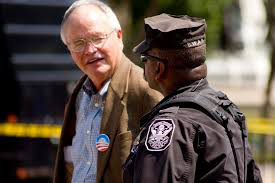
Gus Speth getting arrested at a Keystone XL protest at the White House. (Photo: Courtesy of James Gustave Speth)
CURWOOD: You did all this research, Gus Speth, for the lawsuit, Juliana versus the US, the Children's Trust lawsuit, to compel the government to protect future generations from this now exploding risk of climate disruption. Talk to me about that lawsuit.
SPETH: The goal of the lawsuit is to compel federal action that would sustain the climate for today's young people and for future generations. It seeks to do that through an innovative constitutional principle, which says that when the federal government acts affirmatively to endanger a group of people like young people, that that creates on it, a responsibility to rectify that injury. There are two big things that have not happened on the climate issue that could make a huge difference now. One is a massive civic mobilization, an unprecedented outpouring of people, of demonstrations, of protests, but they get attention. And we've had incidents before, or marches before, but we haven't had anything like this sustained pressure on the system that the public now needs to bring. The other thing that could be new in the picture, is this judicial intervention.
CURWOOD: Your prescription for solving the problem of government inaction on climate change, sounds a bit like their response to at least some elements of institutional racism, going back a couple generations now, in other words, a lot of marching and protests and sit-ins and demos. And that ultimately, the courts spoke up, and began to chip away at our system of institutional racism, which, of course, sadly, is not completely gone today, but certainly very different than what it was back in the day when, when Jim Crow reigned. What kind of parallels might you see there?
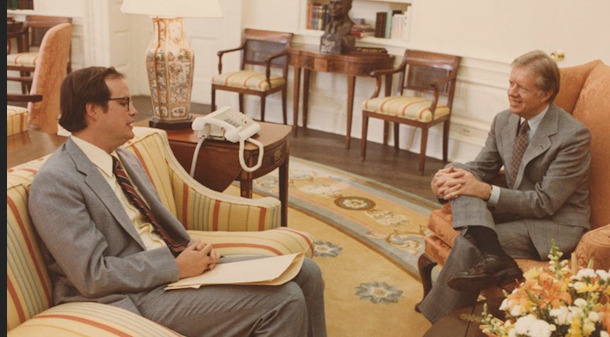
Gus Speth with Jimmy Carter in the Oval Office, 1980. (Photo: Courtesy of James Gustave Speth)
SPETH: Well, you know, Steve, it’s fascinating to be looking back on it. First, the Civil Rights Movement, and more recently, the Black Lives Matter, that have pushed that, you know, early civil rights into a new phase, we in the environmental area, have been inspired by that. When I helped to start the Natural Resources Defense Council in the late 1960s, we were inspired by the Civil Rights Movement. And we wanted to follow what the NAACP Legal Defense Fund had done by creating a public interest law firm for environmental issues. And now I think what is going on in the Black Lives Matter, and other areas of progress, that this is a diffusion of these issues in the environmental justice and the climate justice concern of bringing them together? This is all very, very hopeful and very inspiring. The sad part looking back on it, is it having been inspired by the Civil Rights Movement, we in our environmental work, didn't really involve, you know, the black community or, or minority communities. And it was only later when Bob Bullard and others have, you know, found so much discrimination in environmental programs. You know, we began to be aware of these linkages, which are now, I hope, part of all the environmental work, but it's still a work in process, as you say.
CURWOOD: We have a long way to go, and at the international level, we see this divide between the global north and global south along economic and racial lines, even when it comes to dealing with the climate and such. Gus, how can we be hopeful if we’ve seen time after time, governments talk about these issues, but at the end of the day, do what the fossil fuel industry wants, and the actions don't add up to being sufficient? What's to be done?
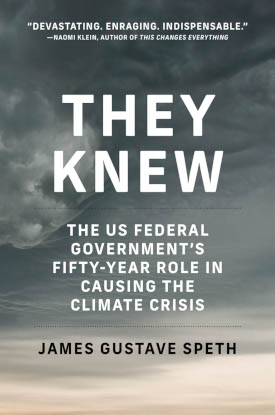
Gus Speth turned his expert analysis for Juliana v. The United States into the book They Knew. (Photo: Courtesy of MIT Press)
SPETH: Well, I hope the book will help with that because a couple of the lessons of the book as what we've been doing isn't working very well. Another lesson is that science alone is not going to carry the day, that the comfortable advocacy that we've been engaging in, myself included, is not going to carry the day. So, I think we need a real outburst. A real rising up of the public. We need everybody out raising hell on this issue. And I hope the book will contribute to this sense of outrage because you can't read how many opportunities we had to deal with this issue and how many we failed to deal with. If we had that plus a powerful judicial intervention into this process, we would have some hope and that you asked about my hope and that is my hope. The basis for hope now.
CURWOOD: James Gustave Speth's book is called, “They Knew: The US Federal Government's Fifty-Year Role in Causing the Climate Crisis.” Gus, thanks so much for taking the time with us today.
SPETH: My pleasure, Steve, it’s good to see you.
Links
Read about Our Children’s Trust and the lawsuit Juliana v. The United States
Living on Earth wants to hear from you!
Living on Earth
62 Calef Highway, Suite 212
Lee, NH 03861
Telephone: 617-287-4121
E-mail: comments@loe.org
Newsletter [Click here]
Donate to Living on Earth!
Living on Earth is an independent media program and relies entirely on contributions from listeners and institutions supporting public service. Please donate now to preserve an independent environmental voice.
NewsletterLiving on Earth offers a weekly delivery of the show's rundown to your mailbox. Sign up for our newsletter today!
 Sailors For The Sea: Be the change you want to sea.
Sailors For The Sea: Be the change you want to sea.
 The Grantham Foundation for the Protection of the Environment: Committed to protecting and improving the health of the global environment.
The Grantham Foundation for the Protection of the Environment: Committed to protecting and improving the health of the global environment.
 Contribute to Living on Earth and receive, as our gift to you, an archival print of one of Mark Seth Lender's extraordinary wildlife photographs. Follow the link to see Mark's current collection of photographs.
Contribute to Living on Earth and receive, as our gift to you, an archival print of one of Mark Seth Lender's extraordinary wildlife photographs. Follow the link to see Mark's current collection of photographs.
 Buy a signed copy of Mark Seth Lender's book Smeagull the Seagull & support Living on Earth
Buy a signed copy of Mark Seth Lender's book Smeagull the Seagull & support Living on Earth

